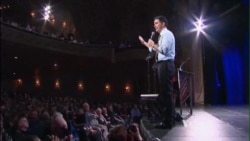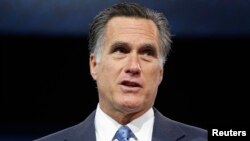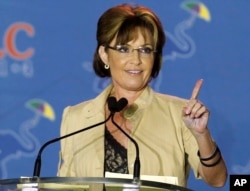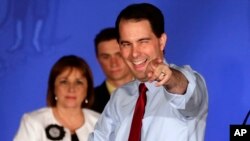No one has officially announced their candidacy but the 2016 battle for the Republican Party’s presidential nomination is off to a fast and furious start.
More than 20 prominent Republicans have indicated some level of interest in running for the White House next year including some who are well known and others who have yet to build a national reputation.
Among the better known is former Alaska Governor Sarah Palin who said she is “seriously interested” in running for president next year. Palin made a splash in 2008 as Sen. John McCain’s vice presidential running mate but wound up getting more attention than she wanted from NBC’s “Saturday Night Live,” which portrayed her as a dim-witted buffoon.
Palin has veered away from elective politics in recent years and has had success as a speaker and commentator with conservative audiences. But even conservative commentators have doubts about whether Palin is serious.
In the lesser-known camp is Louisiana Governor Bobby Jindal. Jindal is also interested in running but told a religious rally that “we can’t just elect a candidate to fix our country…We need a spiritual revival to fix our country.”
Jindal was raised Hindu but converted to Catholicism and drew attention for his repeated warnings that “radical Islam is a threat to our way of life.” Like other Republicans seeking a national profile, Jindal will be looking for a way to stand out in what is expected to be a large field of candidates.
It’s just too early to say whether Republican voters will be taken with some of the new faces or will fall in line behind some of the more familiar faces in the party like 2012 nominee Mitt Romney and former Florida Governor Jeb Bush.
Both men have made moves toward running, but Romney has run into flak from some conservatives who say he had his chance and it’s time for someone else.
Splintered party
Republicans did extraordinarily well in last November’s midterm elections, retaking control of the Senate and adding to their solid majority in the House of Representatives. That electoral success has encouraged Republicans about winning the White House back in 2016.
But if recent history is any guide, the splits and strains within the party will be on full display in the run-up to the start of the primary and caucus season early next year.
Some of those strains are already showing in the new Republican-led Congress, particularly between so called ‘mainstream’ or ‘Chamber of Commerce’ type Republicans who focus on economic issues and Tea Party factions that are consumed with cutting the size of the federal government.
Add to that mix evangelical Christian voters who are most concerned with social issues such as abortion and gay marriage and foreign policy hawks who want to reassert U.S. power around the world.
There is often overlap among these factions within the Republican Party but the prospect of a large presidential field in 2016 means several of the White House contenders will be looking for a base of support within the various factions.
Bush, Romney and New Jersey Governor Chris Christie would compete for the votes of mainstream Republican voters, especially those who want to win at all costs in 2016 and who assume Democrats will nominate former Secretary of State Hillary Clinton.
Tea Party activists will have several heroes to choose from in the upcoming primaries and caucuses.
Texas Senator Ted Cruz, Kentucky Senator Rand Paul and Florida Senator Marco Rubio all won their Senate seats with strong support from Tea Party activists and will likely look to them again for help in the primaries. Former Texas Governor Rick Perry also hopes to compete in this category.
Rubio made a good showing at a recent forum sponsored by the conservative billionaire Koch brothers in California.
Charles and David Koch have created a formidable fundraising network that spent about $290 million helping Republicans in last year’s congressional midterm elections. They hope to raise $889 million from wealthy contributors to help the party in the 2016 election. Politico reports that Rubio won an informal straw poll of donors who attended the conference, coming out ahead of Cruz and Paul.
Social Conservatives’ options
Evangelical voters may find their champion in either former Arkansas Governor Mike Huckabee, who also ran in 2008, or former Pennsylvania Senator Rick Santorum, who came in second in the overall delegate count to Romney in 2012.
Jindal also looks as though he is angling to appeal to Christian activists as is retired neurosurgeon Ben Carson, the only African-American considering a run for the Republican nomination.
Analyst John Fortier of the Bipartisan Policy Center said it will take a while for the Republican presidential field to sort itself out.
“On the Republican side it really is wide open and you will have a number of figures who are establishment-oriented as well as some who are clearly much more Tea Party-oriented,” he said. “And really it is matter of having a strong central base and being able to coalesce more of that as one goes along. It’s really very unpredictable on the Republican side at this point.”
Many Republicans are looking for a new face, someone who can convey the conservative essence of the party but who may also appeal to voters beyond the traditional bounds of the Republican Party.
Some look to Wisconsin Governor Scott Walker, who has won three elections in four years (one of them a recall election) in what is nominally a Democratic state. Walker was among several possible Republican presidential candidates who took part in a recent conservative forum in Iowa.
Like many of the other speakers, Walker went after President Barack Obama’s response to the recent terror attacks in Paris.
“We need a president who doesn’t sit in Washington, D.C. when world leaders are standing together against terrorism in Paris,” Walker said.
For pure entertainment value at the Iowa event there was also the interest expressed by real estate mogul and TV reality star Donald Trump. Trump dismissed the possibility of Romney winning the nomination a second time.
“It can’t be Mitt because Mitt ran and failed,” he said.
Trump also ruled out Bush and told conservative activists that the son and brother of presidents was “the last thing we need.” Trump said he is considering a run, adding “I know what needs to be done to make America great again.”
Whether it winds up being a new face or an old one, Republican strategist Scott Faulkner said the party also needs to consider its image and message as it heads into the 2016 campaign cycle.
“It isn’t just about demographics and the Electoral College,” he said. “It is really about coming up with a universal message that inspires, not just saying I’m not the other guy. And Republicans have not coalesced around that very well really since the 1980s.”









